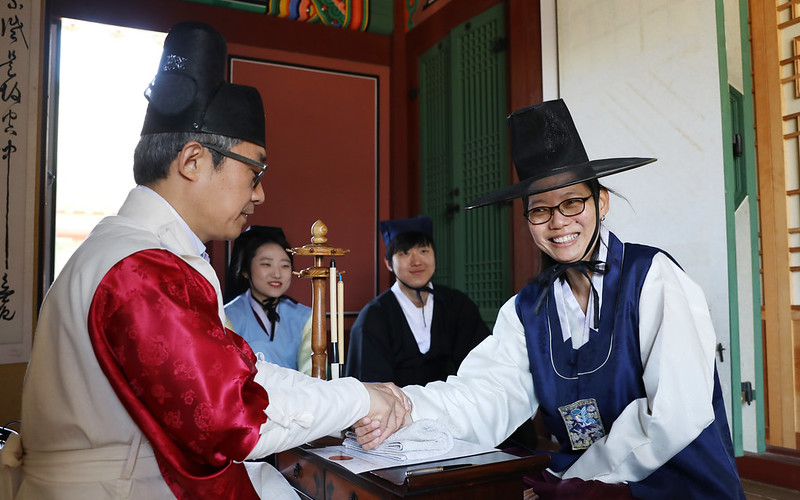- 한국어
- English
- 日本語
- 中文
- العربية
- Español
- Français
- Deutsch
- Pусский
- Tiếng Việt
- Indonesian
By Honorary Reporter Tantri Candrawati Tiong from Indonesia

A doctor of traditional Korean medicine gauges a person’s pulse. (Korea.net DB)
The Korean Cultural Center (KCC) in Jakarta from May 6-20 held an online event with Kim Si-hyun, a doctor of traditional Korean medicine, with each of the program's three weeks having a different topic. This article focuses on traditional Korean medicine's view of the human immune system and how to strengthen bodily immunity through proper eating and lifestyle.
There is no vaccine or cure for the novel coronavirus disease (COVID-19), but it can be prevented by wearing a protective mask whenever going outside and cleaning hands frequently through washing or using hand sanitizer. These steps prevent the coronavirus from penetrating our lungs, and because it can last longer in the air, the coronavirus can easily stick to hands. At certain temperature and humidity levels, the pandemic can also spread.
Kim said our bodies have 800-4,000 cancerous cells but many do not get cancer. Why? Because of the body's natural ability to heal itself. In other words, people can recover without medicine and by getting sufficient rest. Whenever a virus or bacteria penetrates the body, the immune system works to suppress it. Some people exposed to a virus get sick but some do not, and this attests to the differing immunity systems among individuals.
The two types of immune systems are 1) man-made vaccines and 2) inherent natural immunity.
Kim also cited the opposing concepts in Eastern and Western medicine. Imagine an empty house that hasn't been inhabited in a long time, and thus it has gotten cold, damp and moldy. Western medicine would opt to remove the mold and spray anti-bacterial drugs on and in the house. Traditional Korean medicine, however, would choose to open the windows to let air circulate and allow sunlight to enter the house for maintaining hygiene and cleaning.
Western medicine also favors vaccines, whereas the Korean approach seeks a stronger immune system.
2. Keep personal hygiene like frequently washing hands or using hand sanitizer.
3. Regular exercise and stretching can stimulate the immune system and accelerate blood circulation. Make time to exercise if you have no time, though excessively working out can lead to higher levels of acid in the body and exhaustion. Gauge your physical condition and workout intensity before hitting the gym.
4. Maintain a normal temperature of 36 degrees Celsius, as a rise or fall of even a single degree can lead to illness. Korea has places with bansinyook, or lower-body bathing in warm water of usually 40 degrees Celsius. The recommended time is 20-30 minutes. A Korean proverb says, "To be healthy, the head must be cool and the lower body or feet must be warm." Thus air conditioning and ice cream are best avoided.
5. Taking vitamin D helps the immune system. Go out in the sun for 30 minutes and eat food rich in the vitamin such as fish, eggs and shiitake mushrooms.
6. Eat a healthy and balanced diet of fruits, vegetables, and food rich in protein and minerals, plus don't eat too much. Garlic, ginger, kimchi, tomatoes, onion, turmeric and ginseng are good for the immune system. Reducing meat consumption also lowers acidity.
7. Gently massage lymph glands for 10 minutes. The five areas of such glands are the area extending from behind the ears to the collarbone, armpits, belly, haunch and behind the knee. Gently tap the gland and swipe the navel in a clockwise circular motion clockwise.
8. Avoid or reduce stress in life. Smiling or laughing helps people relax and stay positive amid hardships. Doing sports, meditation, a hobby or religious activity can all lower stress.
9. Drink a sufficient amount of water to keep bodily immunity stable and produce antihistamines to ensure proper bowel movements. Avoid drinking cold water. Water content in the body falls 2% when someone is thirsty, so gulping often is recommended.
chaey0726@korea.kr
*This article is written by a Korea.net Honorary Reporter. Our group of Honorary Reporters are from all around the world, and they share with Korea.net their love and passion for all things Korean.